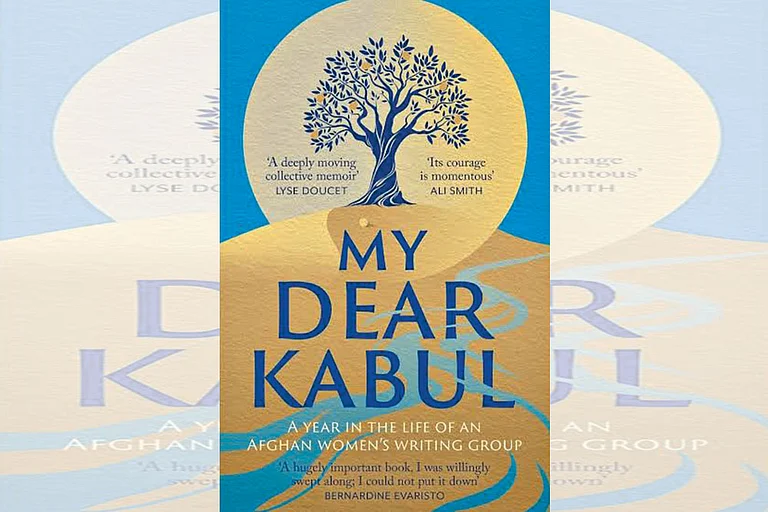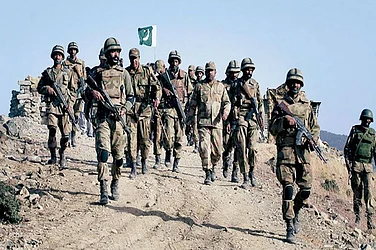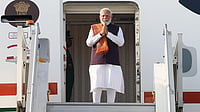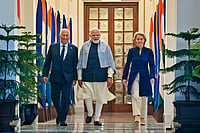There was a time when Kabul, Afghanistan’s capital, was a vibrant, swinging city. Stylish women in pencil skirts and make-up worked as doctors, nurses, secretaries and teachers, and enjoyed a degree of personal freedom hard to imagine today.
This was when Mohammad Zahir Shah, Afghanistan’s progressive King was on the throne (1933 till 1973). His 40-year rule was a time of women empowerment. The Queen and members of the royal household did not wear the veil and attended state functions together with the King. Zahir Shah was a reformist ruler and laid great emphasis on women’s education. Schools and colleges for girls sprung up across the country.
Kabul University allowed women to join from 1947. By 1973 there were an estimated 150,000 girls in schools across Afghanistan. But stability did not last long. Zahir Shah was thrown out in a bloodless coup in 1973 and later fled to Europe.
Afghanistan became a republic with the ouster of the King and its first president, Mohammed Daoud, enshrined women’s right in the 1976 Constitution (Article27). In 1978, Daoud was removed in a coup; but the lives of women were not affected. Communist leader president Najibullah, who invited the Russian army to prop up his government, upheld women’s rights. It was only when the Mujahideen threw out the Russians and the tribal leaders who had fought against the "ungodly" Communists came into their own that anti-women diktats came to stay. After the messy civil war following the withdrawal of the Russian army, the first Taliban government came in to crush all semblance of equality promised in the Constitution. The Taliban became a force from 1994 and took control of the government in 1996. Mullah Omar, the Taliban chief and former Mujahideen fighter who lost one eye during a fire fight with Soviet army, introduced sharia law in the country.
Taliban's First tenure: 1996-2001
Everybody suffered under the Taliban, but women were the worst hit. They were no longer allowed to step out of their homes without the burqa and had to be escorted by a male relative. Girls were banned from school, college and universities. Working outside the home was discouraged. Women could not go to a male doctor, denying medical access.
Soon after the Taliban took control of Kabul, residents were ordered to cover their ground and first-floor windows to make sure that girls or women of the family were not visible to passersby. Women wearing nail polish ran the risk of getting their finger chopped off in those early days.
Fathers, brothers or husbands defending women had to pay the price. Amnesty International in its report on the plight of women in Afghanistan during the first Taliban rule, quoted a young girl recalling ‘’They shot my father right in front of me. It was nine o'clock at night. They came to our house and told him they had orders to kill him because he allowed me to go to school. The Mujahideen had already stopped me from going to school, but that was not enough. I cannot describe what they did to me after killing my father...'
Women were squeezed out from Afghanistan’s public spaces and were literally imprisoned at home, bearing the brunt of violence from husbands and male relatives. There was no empathy for girls, who they were seen more as culprits than victims in cases of rape and sexual abuse.
A break came for Afghan women after the 9/11 attack. When US asked the Taliban to hand over Osama bin Laden, who was operating from Afghanistan, Mullah Omar refused as it was not tribal tradition to do so to an "honoured guest’’. The Taliban offered no resistance in US and NATO invasion that followed and disappeared.
US occupation
The 20-year occupation of Afghanistan by the US was a golden age for women. They flourished under both President Hamid Karzai and his successor Asraf Ghani. Women were back in schools and colleges, and in the workforce as teachers, doctors, beauticians, entrepreneurs, and political leaders. There was an explosion of women journalists in newspapers and private television channels, where they worked side by side with men. Women also joined both the Afghan army and the police force. In 2012, Niloofar Rahmani became the first pilot in the air force training programme to fly solo. Latifa Nabizada was the first Afghan women pilot to fly a military helicopter.
There was no moral policing and while many girls from traditional families preferred to wear a loose scarf that partially covered their hair, those who wanted could drop the head cover.
As in the first republican Constitution framed by President Daud, the democratic Constitution of 2003 reinforced women’s rights and their status as equal members of society. In 2009, Afghanistan adopted another progressive pro-women legislation called the Elimination of Violence against Women (EVAW).
This was a landmark legislation aimed at protecting the long-suffering girls and women. For the first time, 22 acts of violence against women were clearly defined. This included rape, forced prostitution, underage marriage, physical violence as well as denying women the right to education, health services and job opportunities.
The punishment for those accused of crimes against women ranged from death sentence to prison sentences as well as payment of compensation to victims. To implement the law, the government set up support centres or safe houses to protect victims fleeing violence at home. A ministry of women’s affairs was set up to look after the wellbeing of women.
But with the Taliban’s return to power on August 15, 2021, the situation is back to square one. Despite Taliban’s assurances during the Doha talks with US negotiators that Taliban 2.0, would be different and kinder to women, the reality now is quite different.
Taliban 2.0: Gender Apartheid.
When news came of Taliban forces advancing towards Kabul, women rushed to markets to buy the burqa. Strict purdah for women is now in force in the country. In 2022, Taliban announced a ban on women studying in universities and working with NGOs. Initially, women were not barred from the universities but could not attend classes with male students; even that fig leaf was dropped by 2022. Girls are allowed to attend school only till the primary level. Once more, women cannot step out without a male escort; nor can they wear attractive bright colours or perfume or high heels that make a sound when walking and attract male attention.
All avenues for employment for women are barred. Beauty parlours that mushroomed across Afghan cities were asked to shut shop. Advertisements with girl models were disfigured with black paint. The closure of beauty parlours pushed 60,000 women out of work. Private companies can no longer employ women.
The Elimination of Violence Against Women law was dropped and men now have a free rein to do what they wish. Shelters provided for women running away from violent abuse have been scrapped. Instead, women who are raped and faced other forms of violence can now end up being accused of ‘moral crimes' and adultery and risk being stoned to death as punishment.
Women cannot study, work, play games, go to a gym or a park. They cannot speak or sing in public because women’s voices can be a temptation for men according to the Taliban’s interpretation of the Sharia law.
And in a latest bizarre edict from the ruling Taliban, the ministry for promotion of virtue and prevention of vice have banned women from hearing others' voice. This was later denied by the Taliban. The misconception was because the Taliban’s minister Khalid Hanafi was quoted as saying “When women are not permitted to call takbir or Athan [Islamic call to prayer], they certainly cannot sing songs or music,” he said. It had nothing to do with two women speaking. However, it is likely that the Taliban would haul up women speaking loudly to each other.
Actress Meryl Streep speaking in September at a UN event on the status of women said a cat has more rights than women in Afghanistan. ``A cat may sit on her front stoop and feel the sun on her face. She may chase a squirrel into the park. A squirrel has more rights than a girl in Afghanistan today, because the public parks have been closed to women and girls by the Taliban."



























